Immerse yourself in the captivating world of eco-lodges, where pristine landscapes intertwine with innovative design and a deep commitment to environmental preservation. These havens offer an unforgettable blend of luxury and sustainability, inviting travelers to connect with nature while fostering a profound appreciation for its delicate balance.
From secluded rainforest retreats to oceanfront sanctuaries, eco-lodges redefine the concept of hospitality, showcasing sustainable practices that minimize environmental impact and promote community well-being.
Eco-Lodge Definition
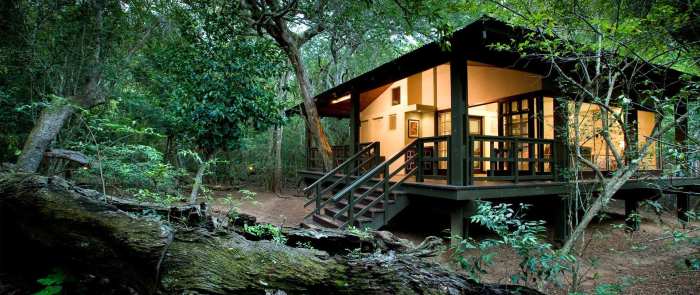
Eco-lodges are tourist accommodations that emphasize sustainability and environmental consciousness. They are typically located in natural areas and prioritize minimizing their impact on the environment while providing a comfortable and immersive experience for guests.
Eco-lodges adhere to strict environmental standards and practices. They often incorporate renewable energy sources, implement water conservation measures, and use eco-friendly building materials. Additionally, they actively support local communities and conservation efforts, contributing to the preservation of the surrounding ecosystem.
When planning a trip to an eco-lodge, it’s essential to pack accordingly. Check out our beach holiday packing list for inspiration on what to bring. From comfortable clothing to toiletries and insect repellent, make sure you have everything you need for a memorable and sustainable stay at an eco-lodge.
Examples of Eco-Lodges Worldwide
There are numerous eco-lodges worldwide, each offering a unique experience while adhering to sustainable principles.
- Inkaterra Reserva Amazonica, Peru: Located in the Peruvian Amazon rainforest, this eco-lodge provides luxurious accommodations while actively supporting conservation initiatives and promoting responsible tourism.
- Soneva Kiri, Thailand: Situated on a private island in the Gulf of Thailand, this eco-lodge is renowned for its innovative eco-friendly practices, including a zero-waste policy and an extensive coral restoration program.
- Grootbos Private Nature Reserve, South Africa: This eco-lodge offers a range of sustainable activities, such as wildlife safaris and guided nature walks, while contributing to local conservation efforts and community development.
Environmental Impact
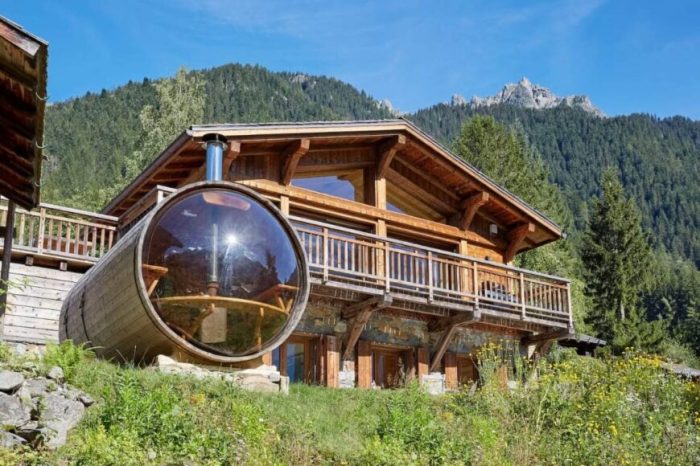
Eco-lodges prioritize environmental conservation, making a positive impact on the natural surroundings. Their sustainable practices align with responsible tourism principles, preserving ecosystems and minimizing ecological footprints.
Sustainable Practices
Eco-lodges implement various sustainable practices to minimize their impact on the environment:
- Energy Efficiency: Employing renewable energy sources like solar and wind power, as well as energy-efficient appliances and lighting systems.
- Water Conservation: Implementing rainwater harvesting, low-flow fixtures, and water-saving irrigation techniques.
- Waste Management: Implementing waste reduction strategies, composting organic waste, and recycling or reusing materials.
- Building Materials: Using sustainable and locally sourced materials, such as bamboo, recycled wood, and biodegradable fabrics.
- Biodiversity Conservation: Preserving and restoring native habitats, supporting local flora and fauna, and engaging in reforestation efforts.
Social and Economic Benefits
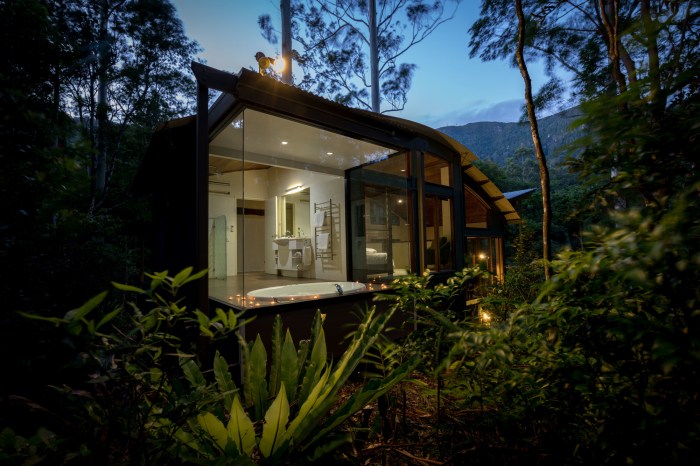
Eco-lodges offer various social and economic benefits to local communities. They provide employment opportunities, support local businesses, and contribute to community development.
Job Creation
Eco-lodges create jobs in various sectors, including hospitality, tourism, and conservation. Local residents are often employed as tour guides, lodge staff, and maintenance personnel. This provides a source of income and helps to improve the local economy.
Community Involvement, Eco-lodges
Eco-lodges often engage with local communities through partnerships and initiatives. They may support local schools, healthcare facilities, or conservation projects. This involvement fosters a sense of community ownership and ensures that the benefits of eco-tourism are shared equitably.
Support for Local Businesses
Eco-lodges often purchase goods and services from local businesses, such as food, crafts, and transportation. This supports the local economy and helps to create a sustainable supply chain.
Amenities and Services
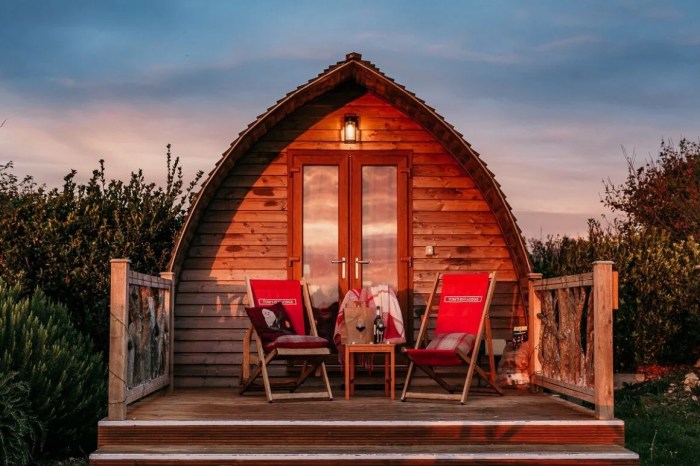
Eco-lodges are designed to provide guests with a comfortable and sustainable stay while minimizing their environmental impact. To achieve this, they offer a range of amenities and services that cater to the needs of eco-conscious travelers.
Eco-lodges offer a unique and sustainable way to experience nature. These lodges are designed to minimize their environmental impact, often using renewable energy sources and sustainable building materials. Many eco-lodges also support local communities and conservation efforts. If you’re looking for a way to travel that’s both luxurious and environmentally conscious, consider booking a stay at one of the many eco-lodges around the world.
The amenities and services offered at eco-lodges vary depending on the location and size of the lodge, but some common offerings include:
Accommodations
- Rustic cabins or bungalows built using sustainable materials
- Eco-friendly bedding and linens
- Private bathrooms with low-flow fixtures
- Outdoor showers or baths
- Solar-powered lighting
Dining
- Organic and locally sourced cuisine
- Vegetarian and vegan options
- Compostable or reusable tableware
- Water filtration systems
- Outdoor dining areas
Activities
- Guided nature walks and hikes
- Wildlife viewing
- Kayaking or canoeing
- Yoga or meditation classes
- Cultural immersion experiences
Certification and Standards
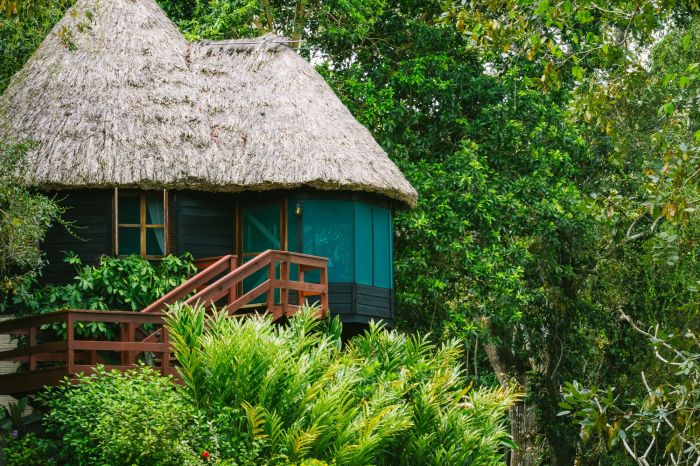
Certification and standards are crucial for eco-lodges to demonstrate their commitment to sustainability and ethical practices. They provide a framework for evaluating and recognizing lodges that meet specific environmental and social criteria, ensuring credibility and transparency for guests and stakeholders.
Various certification programs exist, each with its own set of standards and criteria. Some of the most prominent include:
Green Globe
- Focuses on environmental sustainability, social responsibility, and economic viability.
- Requires lodges to meet specific criteria in areas such as energy efficiency, water conservation, waste management, and community engagement.
LEED (Leadership in Energy and Environmental Design)
- Recognizes buildings that are designed and operated to reduce environmental impact and improve occupant health.
- Assesses lodges based on criteria such as site selection, water efficiency, energy efficiency, and indoor environmental quality.
Rainforest Alliance
- Promotes sustainable agriculture and responsible land management in tropical regions.
- Certifies eco-lodges that demonstrate responsible use of natural resources, protect biodiversity, and support local communities.
Biosphere Responsible Tourism
- Assesses lodges based on their environmental, social, and economic performance.
- Requires lodges to demonstrate a commitment to sustainable tourism practices, including reducing carbon emissions, conserving water, and supporting local businesses.
Marketing and Promotion
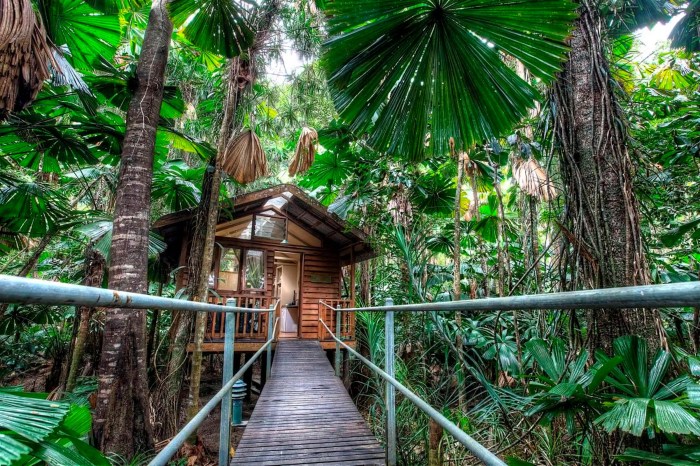
Marketing and promotion are crucial for the success of eco-lodges. It involves developing and implementing strategies to attract target audiences and create awareness about the unique offerings of eco-lodges.
Target Audience
The target audience for eco-lodges includes individuals and groups interested in sustainable travel, nature enthusiasts, adventure seekers, and those seeking unique and authentic travel experiences.
Eco-lodges offer a unique blend of sustainability and comfort, catering to travelers seeking a responsible and immersive experience in nature. While they may not provide the opulent amenities of luxury beach resorts , eco-lodges prioritize the preservation of the environment, often incorporating local materials and eco-friendly practices.
They provide a serene and authentic escape, allowing guests to connect with the surrounding ecosystem and support local communities.
Effective Marketing Channels
Effective marketing channels for eco-lodges include:
- Online travel agencies (OTAs)
- Social media platforms
- Content marketing (e.g., blogs, articles, videos)
- Email marketing
- Public relations (e.g., press releases, media coverage)
- Collaborations with travel bloggers and influencers
Case Studies
Eco-lodges worldwide are setting examples of sustainable tourism. Let’s explore case studies of successful eco-lodges, examining their best practices and lessons learned.
Finca Bellavista, Costa Rica
- Best Practices: Focus on biodiversity conservation, community involvement, and energy efficiency.
- Lessons Learned: Collaboration with local communities is crucial for long-term success.
Inkaterra Reserva Amazónica, Peru
- Best Practices: Sustainable jungle lodges, guided tours by local experts, and rainforest restoration initiatives.
- Lessons Learned: Eco-tourism can support conservation efforts and create local employment opportunities.
Six Senses Yao Noi, Thailand
- Best Practices: Zero-waste management, use of renewable energy, and organic farming.
- Lessons Learned: Innovative approaches to sustainability can enhance guest experiences.
Concluding Remarks: Eco-lodges

As the sun sets on our exploration of eco-lodges, we are left with a renewed sense of awe and responsibility towards the planet we share. These extraordinary destinations serve as beacons of hope, demonstrating that sustainable tourism can coexist harmoniously with the preservation of our natural heritage. May we all strive to embrace the principles of eco-lodges, fostering a future where travel enriches both ourselves and the world around us.
Helpful Answers
What is the primary focus of eco-lodges?
Eco-lodges prioritize environmental conservation and sustainable practices, aiming to minimize their impact on the surrounding ecosystem while promoting local community involvement.
How do eco-lodges contribute to environmental preservation?
Eco-lodges implement various measures to reduce their carbon footprint, such as using renewable energy sources, conserving water, and implementing waste management systems. They also promote responsible tourism practices that minimize disturbance to wildlife and natural habitats.
What are the social and economic benefits of eco-lodges?
Eco-lodges create employment opportunities for local communities, supporting sustainable livelihoods and preserving traditional cultures. They also contribute to the preservation of natural resources, which can benefit local economies reliant on tourism and agriculture.